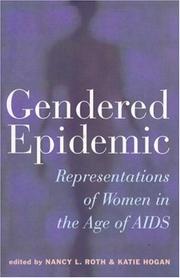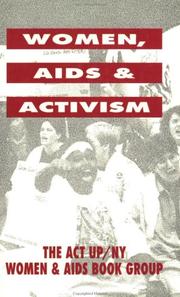| Listing 1 - 10 of 41 | << page >> |
Sort by
|
Book
Year: 2020 Publisher: California : University of California Press,
Abstract | Keywords | Export | Availability | Bookmark
 Loading...
Loading...Choose an application
- Reference Manager
- EndNote
- RefWorks (Direct export to RefWorks)
In this vitally important book, medical anthropologist Holly Wardlow takes readers through a ten-year history of the AIDS epidemic in Tari, Papua New Guinea, focusing on the political and economic factors that make women vulnerable to HIV and on their experiences with antiretroviral therapy. Alive with the women's stories about being trafficked to gold mines, resisting polygynous marriages, and struggling to be perceived as morally upright, Fencing in AIDS demonstrates that being female shapes every aspect of the AIDS epidemic. Offering crucial insights into the anthropologies of mining, ethics, and gender, this is essential reading for scholars and professionals addressing the global AIDS crisis today.
Book
Year: 2020 Publisher: California : University of California Press,
Abstract | Keywords | Export | Availability | Bookmark
 Loading...
Loading...Choose an application
- Reference Manager
- EndNote
- RefWorks (Direct export to RefWorks)
In this vitally important book, medical anthropologist Holly Wardlow takes readers through a ten-year history of the AIDS epidemic in Tari, Papua New Guinea, focusing on the political and economic factors that make women vulnerable to HIV and on their experiences with antiretroviral therapy. Alive with the women's stories about being trafficked to gold mines, resisting polygynous marriages, and struggling to be perceived as morally upright, Fencing in AIDS demonstrates that being female shapes every aspect of the AIDS epidemic. Offering crucial insights into the anthropologies of mining, ethics, and gender, this is essential reading for scholars and professionals addressing the global AIDS crisis today.
Book
ISBN: 2825411914 Year: 1996 Publisher: Geneva WCC
Abstract | Keywords | Export | Availability | Bookmark
 Loading...
Loading...Choose an application
- Reference Manager
- EndNote
- RefWorks (Direct export to RefWorks)
Book
Year: 2020 Publisher: California : University of California Press,
Abstract | Keywords | Export | Availability | Bookmark
 Loading...
Loading...Choose an application
- Reference Manager
- EndNote
- RefWorks (Direct export to RefWorks)
In this vitally important book, medical anthropologist Holly Wardlow takes readers through a ten-year history of the AIDS epidemic in Tari, Papua New Guinea, focusing on the political and economic factors that make women vulnerable to HIV and on their experiences with antiretroviral therapy. Alive with the women's stories about being trafficked to gold mines, resisting polygynous marriages, and struggling to be perceived as morally upright, Fencing in AIDS demonstrates that being female shapes every aspect of the AIDS epidemic. Offering crucial insights into the anthropologies of mining, ethics, and gender, this is essential reading for scholars and professionals addressing the global AIDS crisis today.

ISBN: 1136673326 0415917859 1315022400 1136673253 Year: 1998 Publisher: New York : Routledge,
Abstract | Keywords | Export | Availability | Bookmark
 Loading...
Loading...Choose an application
- Reference Manager
- EndNote
- RefWorks (Direct export to RefWorks)
First Published in 1998. Routledge is an imprint of Taylor & Francis, an informa company.
Book
Year: 2020 Publisher: Oakland, California : University of California Press,
Abstract | Keywords | Export | Availability | Bookmark
 Loading...
Loading...Choose an application
- Reference Manager
- EndNote
- RefWorks (Direct export to RefWorks)
"In her vitally important new book, medical anthropologist Holly Wardlow takes readers through a ten-year history of the AIDS epidemic in Tari, Papua New Guinea, focusing on the political and economic factors that make women vulnerable to HIV and their experiences of being on antiretroviral therapy. Alive with women's stories about being trafficked to gold mines, resisting polygynous marriages, and struggling to be perceived as morally upright, Fencing in AIDS demonstrates that being female shapes every aspect of the AIDS epidemic. Making crucial interventions into the anthropologies of mining, ethics, and gender, it is essential reading for scholars and professionals addressing global AIDS crises today".
Book
Year: 2020 Publisher: Oakland, California : University of California Press,
Abstract | Keywords | Export | Availability | Bookmark
 Loading...
Loading...Choose an application
- Reference Manager
- EndNote
- RefWorks (Direct export to RefWorks)
"In her vitally important new book, medical anthropologist Holly Wardlow takes readers through a ten-year history of the AIDS epidemic in Tari, Papua New Guinea, focusing on the political and economic factors that make women vulnerable to HIV and their experiences of being on antiretroviral therapy. Alive with women's stories about being trafficked to gold mines, resisting polygynous marriages, and struggling to be perceived as morally upright, Fencing in AIDS demonstrates that being female shapes every aspect of the AIDS epidemic. Making crucial interventions into the anthropologies of mining, ethics, and gender, it is essential reading for scholars and professionals addressing global AIDS crises today".
Book
Year: 2020 Publisher: Oakland, California : University of California Press,
Abstract | Keywords | Export | Availability | Bookmark
 Loading...
Loading...Choose an application
- Reference Manager
- EndNote
- RefWorks (Direct export to RefWorks)
"In her vitally important new book, medical anthropologist Holly Wardlow takes readers through a ten-year history of the AIDS epidemic in Tari, Papua New Guinea, focusing on the political and economic factors that make women vulnerable to HIV and their experiences of being on antiretroviral therapy. Alive with women's stories about being trafficked to gold mines, resisting polygynous marriages, and struggling to be perceived as morally upright, Fencing in AIDS demonstrates that being female shapes every aspect of the AIDS epidemic. Making crucial interventions into the anthropologies of mining, ethics, and gender, it is essential reading for scholars and professionals addressing global AIDS crises today".

ISBN: 0896083934 Year: 1992 Publisher: Boston (Mass.) : South End press,
Abstract | Keywords | Export | Availability | Bookmark
 Loading...
Loading...Choose an application
- Reference Manager
- EndNote
- RefWorks (Direct export to RefWorks)
AIDS (Disease) in women --- Political aspects. --- Social aspects.
Book
Year: 2006 Publisher: [Atlanta, Ga.] : Centers for Disease Control and Prevention,
Abstract | Keywords | Export | Availability | Bookmark
 Loading...
Loading...Choose an application
- Reference Manager
- EndNote
- RefWorks (Direct export to RefWorks)
HIV infections --- AIDS (Disease) in women --- Women --- Sexual behavior.
| Listing 1 - 10 of 41 | << page >> |
Sort by
|

 Search
Search Feedback
Feedback About UniCat
About UniCat  Help
Help News
News